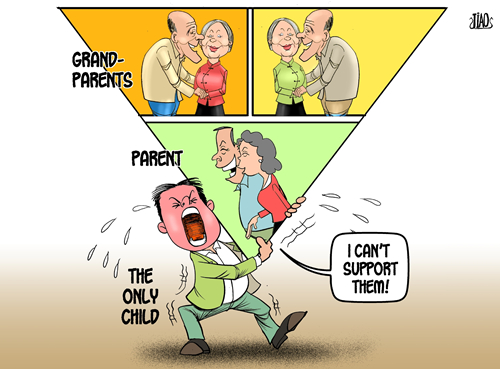China’s aging population will reach 255m by 2020
|
|
|
Inverted pyramid [By Jiao Haiyang/China.org.cn] |
Chinese authorities are projecting the country’s aged population (above 60 years old) will reach 255 million by 2020, but the provision of necessary healthcare and nursing will fall seriously short of requirements.
According to a plan for elderly healthcare in the 13th Five-Year Plan (2016-2020) jointly issued by 13 Chinese government departments including the National Health and Family Planning Commission and National Development and Reform Commission, the aging population will grow at an average rate of 6.4 million a year. By 2020, there will be 255 million elders, representing at least 17.8 percent of the entire Chinese population.
The planning document indicates there will be an increasing number of totally and partially disabled elders in the future. In 2015, the figure was 40.63 million, among whom 11.35 million had disability identity certificates.
However, China lags behind in elderly healthcare services and the growing population imposes worrying pressures on the system. In 2015, China had 453 elderly convalescent hospitals, 168 nursing homes and 65 nursing service stations to provide the much-needed medical care for the elderly.
Also in 2015, there were only 36,441, 11,180 and 316 staff members respectively in the specialist hospitals, nursing homes, and nursing stations.
Luo Qimin, a senior engineer who has been undertaking researches into elderly people’s rehabilitation assistance devices for more than two decades, told 21st Century Business Herald that China has just made a start in dealing with aging issues, which are very complicated.
“The most urgent issue is the government should organize a really professional team on the national level, involving every aspect, including medical care, rehabilitation, creation of environment suitable for the elderly, and policy-making, and treating the aging problem as a severe problem needing urgent resolution,” he said.
The planning document proposes the concept of “growing old healthily,” which means that to comprehensively and systematically intervene at an early stage of life in all elements that may influence health. This will create a favorable environment for living and nurture social support for elders’ health, which can extend the life expectancy and maintain good health.
It also pointed out that China has not built a comprehensive and continuous service system yet to meet elders’ various health demands.
Li Fen, a research director from Shanghai Healthcare Development Research Center, added that elderly people usually suffer from more than one disease including chronic conditions, so there is great need for close cooperation among various hospitals and medical care institutions and personnel, as well as in the technologies and medicines. Currently, there is no strong connection and interaction among different institutions and medical professionals.
